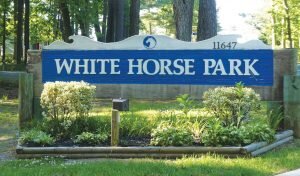
About 55 full-time residents of White Horse Park, a seasonal campground subdivision, are seeking to remain at the park year-round via a lawsuit, administrative appeal and a text amendment.
By Elizabeth Bonin, Staff Writer
(June 11, 2020) The full-time residents of White Horse Park are exploring multiple avenues to remain there: a lawsuit, an administrative appeal and a county zoning code text amendment.
The amendment, according to attorney Hugh Cropper, would allow the 55 full-time residents of the park who have lived there since June 2018, to remain in the park until they move, sell the unit or die.
Cropper submitted a similar amendment last year, but it was rejected by the Worcester County Commissioners. This amendment is different because it specifies that it’s only for the 55 residents, while last year’s was a percentage of the park, Cropper said.
Although the amendment has yet to go to the planning commission, Cropper has received comments on it from various county departments.
“It [staff report] talks about the sewer adequacy of Assateague Pointe, which has nothing to do with it because we’re not even saying the people at Assateague Pointe can stay,” Cropper said. “We’re limiting it to the people at White Horse Park that were there as of 2018.”
He added that sewer adequacy shouldn’t be an issue because the 55 residents won’t add to the current usage.
“As a matter of fact, it’s going down,” Cropper said. “Since the filing of the lawsuit, some of my year-round folks have actually passed away and died, probably associated with anxiety from the county’s unreasonable position.”
Those 55 owners or occupants of units in the 465-unit campground community association have been fighting to stay in the seasonal park year-round. A zoning stipulation states that, from Sept. 30 to April first, they can only occupy the unit for 30 consecutive days or an aggregate of 60 days.
Most residents are older and struggle with disability or low incomes.
After failing to get a hearing on the amendment before the Worcester County Board of Zoning Appeals, Cropper filed suit in Worcester County Circuit Court in November. He also asked for a declaratory judgment and an injunction halting any action against the residents. Worcester County had said that noncompliant residents could be fined up to $1,000 a day.
If the circuit court agrees with Cropper’s arguments, the case would be sent to the county board of zoning appeals.
James W. Almand, White Horse Park Community Association’s attorney, successfully petitioned the court in December to allow the association to intervene in the case.
Almand argued that the lawsuit would not just affect the current full-time residents and that the park’s board of directors were obligated to maintain the seasonal nature of the park, even if previous boards had failed to do so.
Cropper said he thinks he has a 90 percent chance of winning the case, noting that the declaration that contains the seasonal zoning law also details other laws that have been largely ignored. For example, the declaration states that the park is for recreational vehicles, but most, if not all, the homes are houses or trailers on foundations.
“The declaration is outdated,” Cropper said. “It’s been violated for 30 years. You can’t just go pick one paragraph out of the declaration and try to enforce it.”
On April 16, the White Horse Park Community Association asked the court to rule that the zoning stipulation is enforceable.
In the memorandum of support, Almand argued that the association could not have known that Realtors advertised the park as full-time or that full-time residents paid mortgages and property taxes consistent with year-round occupancy, which residents have cited as reasons why they should remain.
He also said that a manager or director encouraging people to live in the park full-time is not a valid reason for full-timers to stay.
“The occupancy limitation may not be waived by a park manager or director,” Almand wrote. “It is for the benefit of all owners.
He added that less than 12 percent of the lots are occupied full-time.
“A small percentage of alleged violations cannot destroy a restriction adhered to by 89 percent of the owners,” Almand said.
The lawsuit and administrative appeal were consolidated into one case last week.
Since the beginning of this year, the full-time residents cannot vote, run for the board of directors or use the park amenities because they are noncompliant with the zoning law.
“It’s a violation of civil rights,” Cropper said. “Can you imagine these older folks living there, veterans in their 80s and they close the laundry room?”
Sue Naplachowski, a full-time resident, said some residents do laundry in other units that had washers and dryers. Laundry had also been temporarily suspended for all residents due to the pandemic.
Naplachowski said she wondered if they would be threatened with a $1,000 a day fine again.
“They just scare the living daylights out of people,” Naplachowski said. “Some people just couldn’t leave and they just stayed in their house in the dark, did what they could or they stayed at other people’s houses in the park.”
Delayed by the coronavirus pandemic, the hearing for the White Horse Park case will take place on Aug. 25. Following that will be a trial on Dec. 8.
